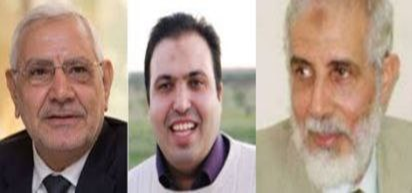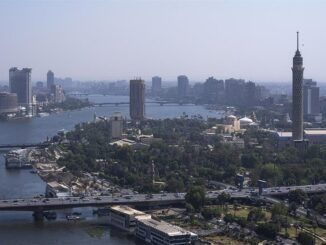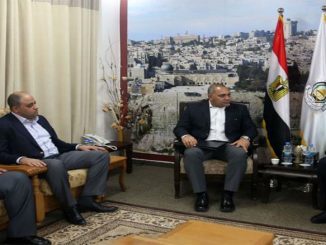
An Egyptian court has sentenced former presidential candidate Abdel Moneim Aboul Fotouh and several prominent political figures to lengthy jail terms for broadly-defined charges, including plotting to overthrow the state.
Rights groups say thousands of politicians, activists and journalists are detained in Egypt after unfair trials or without legal basis, usually based on trumped up charges.
An Egyptian court has sentenced Abdel Moneim Aboul-Fotouh and Mahmoud Ezzat to 15 years in prison; and Mohammed Qassas to 10 years – allegedly for disseminating false news and inciting against state institutions.
An Egyptian court on Sunday sentenced former presidential candidate Dr. Abdel Moneim Aboul-Fotouh and Former Brotherhood acting leader Dr. Mahmoud Ezzat to 15 years in prison.; while Mohammed Qassas, the deputy head of Misr al-Qawia (Strong Egypt), was handed a 10-year sentence, reported the Associated Press, citing judicial sources.
Also, Ibrahim Mounir, a Brotherhood leader living in exile, was handed a life sentence, according to Reuters.
According to judicial sources, the opposition figures were charged of “spreading false news” and “incitement against state institutions”.
Aboul-Foutouh, 70, a former member of the Muslim Brotherhood and leader of opposition Misr al-Qawia (Strong Egypt), was among 25 people who were sentenced on Sunday.
Amnesty International says the verdict against the head of the Strong Egypt Party, Abdel Moneim Aboul Fotouh, and his deputy, Mohamed al-Qassas, is a continuation of the “blatant repression” against them after years of medical neglect.
Abul Ela Madi, head of the Wasat Party, wrote on Twitter: A short while ago, my brother, Dr. Abdel Moneim Aboul Fotouh, former Secretary-General of the Arab Doctors Union and a former presidential candidate, was sentenced to 15 years in prison, and his son Ahmed was sentenced to the same sentence, and my brother, Mohammed Al-Qassas, was sentenced to 10 years in prison, which is a shocking and sad ruling. “Allah (Alone) is sufficient for us, and He is the Best Disposer of affairs (for us)”; and in front of Allah, all opponents will gather (for judgment).
Former Brotherhood leader Mahmoud Ezzat, 77, who is already facing serving multiple life sentences on other charges, was also sentenced to 15 years, while Mohammed Qassas, the deputy head of Misr al-Qawia, was handed a 10-year sentence.
Aboul-Fotouh, 71, was arrested in 2018 after he joined a call to boycott that year’s presidential election, which Abdel Fattah al-Sisi won with a landslide. He was charged with spreading false news with the aim of harming national interests and had been held in pre-trial detention since.
In June 2021, the State Security Prosecution issued a decision to release him, dropping some of the charges he faced since his arrest, but his detention was renewed after the prosecution filed new charges against him pending another case.
While the maximum period of pre-trial detention is two years according to Egyptian law, it is common in Egypt to bring renewed charges against political detainees after the expiry of the two-year period, in what rights groups have described as “recycling of existing cases” to enable indefinite detention.
Aboul-Fotouh has suffered chronic health issues while in detention and has long complained of medical negligence, a practice that has been widely documented in Egyptian prisons by human rights groups.
In April, his family said that he was subject to a “barbaric” assault by guards in his cell at the notorious Tora prison complex.
The former presidential candidate is one of at least 60,000 political prisoners estimated to have been jailed since Sisi took power in a coup in 2013.
Sisi overthrew the country’s first democratically elected president, Mohamed Morsi, a leading figure in the Muslim Brotherhood. Several Brotherhood leaders have died in custody in recent years, including Morsi.
Rights groups have said their deaths were most likely due to medical negligence and poor conditions in jails.
Last week, Cairo-based think tank Shafafiya (Transparency Centre) said in a new report that at least 16,064 people have been victims of politically motivated prosecutions in Egypt in 2020 and 2021.
Shafafiya’s database documented the persecution of 10,291 people who have been subjected to detention or prosecution during 2020, and 5,773 people in 2021.
The report highlighted the cases of those targeted due to their involvement in the public sphere, including protests as well as sports events.
Among the accusations brought against the defendants are “joining a terrorist group” and “attempting to overthrow the regime”.
Rights groups have repeatedly criticized such mass sentencings in Egypt and called on authorities to ensure fair trials.
More than half of all prisoners in Egypt are political, according to the Arabic Network for Human Rights Information.
The number of prisoners in the country totalled 120,000 in March 2021, at least 26,000 of whom were held in pre-trial detention.



